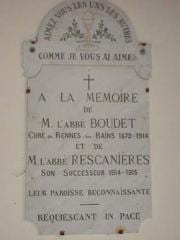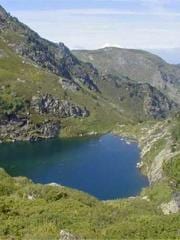Boudet
Lachrymae, Chapter IV: The Final Chapter
An Online Journal by Richard Stanley<
(Originally appeared in R. S.' MySpace<, December 9th, 2007.)
Brethren, I have invited you here to this ancient, invisible theatre with the intention of not only unmasking the killer God responsible for these crimes against 'reality', but more cogently, to provide an unambiguous solution to two or perhaps three long running esoteric enigmas!
I salute those who have stayed with the program from the top. For late joiners I include an index to conjure order out of the scrolling chaos and serve as an aid memoir for those hardy few who dare read further. I have very little keyboard time at present and less in the months to come. Until we meet again this strange saga is my gift to you.
Be warned the completed text contains 'spoilers' and may be hazardous to your belief systems.
Rescanières: another unsolved death?
A memorial slab
Stand in the covered hallway that is in front of the church of Rennes-les-Bains, and you will find that the community indeed had respect – more so than for the other priests that served the community, it seemed – for Boudet. That in itself should be remarkable. However, there is also another name on the memorial slab: Rescanières.
The interesting thing is that Rescanières only served as priest of Rennes-les-Bains for one year: 1914 to 1915. It left him little time to leave an impression, it seems, but apparently he did. And the reason why and how he did so, has to do with his sudden, unexpected – and premature death: Rescanières was only 47 years old when he died. Might it therefore come as a surprise that some believe that he was murdered?
One of Otto Rahn's Grail lakes
La vraie langue celtique et le Cromleck de Rennes-les-Bains.
The treasure of Volkes tectosages.
A Roman proconsul of the name of Cæpion took from a votive lake 80 tons of gold and money and immediately re-melted this into ingots. This apparantly disappeared during its transport towards the port of Narbonne following an attack from Volkes tectosages upset by this profanation of their sacred offerings. They would have then withdrawn to the high valley of the Aude and would have hidden the treasure in this area which is easy to defend.
Boudet speaks directly of the Volkes Tectosages, who became Galatian after Brennus, the Celtic Raven God, took the treasures of Delphi and brought them to Tolosa (Toulouse)[Strabo]. The treasure was cursed and so they threw them into a lake.




Последние комментарии
13 лет 50 недель назад
13 лет 50 недель назад
13 лет 50 недель назад
13 лет 51 неделя назад
14 лет 2 недели назад
14 лет 7 недель назад